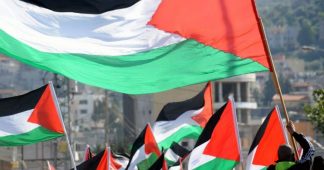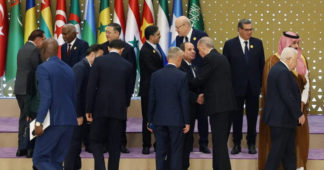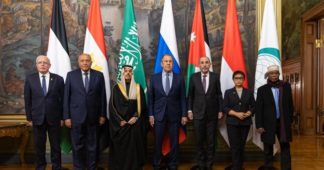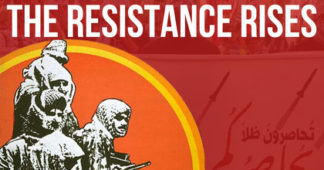Full speech by the President of the Syrian Arab Republic, Bashar al-Assad, on November 11, 2024.
Delivered at the Extraordinary Arab and Islamic Summit held in Riyadh to address the consequences of ongoing Israeli aggression in Palestinian territories and Lebanon, as well as developments in the region.
Source: Council of Ministers of the Syrian Arab Republic
Translation : resistancenews.org
Bashar al-Assad: His Highness Prince Mohammed bin Salman, Crown Prince of the Kingdom of Saudi Arabia, Your Highnesses, Majesties, and Excellencies,
I will not delve into the inalienable and historic rights of the Palestinians and the urgent duty to defend them firmly, nor the resilience of the Palestinian and Lebanese peoples and our duty to support them immediately and fully. Nor will I discuss the legitimacy of their resistance in both nations, a resistance that embodies honor, dignity, and nobility, through the achievements and sacrifices of its valiant leaders and brave fighters. I also will not dwell on the Nazi-like brutality of the Zionist occupiers, their crimes, their artificial entity, or how Western support has transformed into direct and open complicity with this regime’s crimes—this is already well-known by the majority of Arabs, Muslims, and many others worldwide.
As for our summit: a year ago, we gathered to express our condemnation and indignation, yet today the crime persists. Are we here to recall past events, or to influence the future? Last year, we insisted on ending the aggression and protecting the Palestinians, but a year later, we see tens of thousands of martyrs and millions of displaced people in Palestine and Lebanon. In 2002, the Arab world proposed a peace initiative; the response was increased massacres of Palestinians.
In 1991, we Arabs trusted in so-called American “goodwill” by joining the Madrid peace process. Yet our peace was used to justify their wars and legitimize their settlements, exposing not a misjudgment but an inability to prepare the necessary tools: we rely on words, while they employ violence. We offer peace, they shed blood.
Preserving our current situation requires keeping the same means; but changing it—as we all desire—demands new means and mechanisms that we have long lacked. If we agree on the principles at hand, how can we translate them into concrete actions and outcomes? To achieve this, we need clear objectives, well-defined results, the right tools to reach them, and a targeted scope to transition from intentions to action, from projects to achievements, from declarations to realities.
Certainly, we all see the rights of the Palestinian people as a vital objective, but what is the worth of these rights if the Palestinians are denied the most fundamental one, the right to life? What value can any right hold for those who are no longer alive? While it’s crucial to uphold all legitimate rights, our immediate priority must be to halt the massacres, extermination, and ethnic cleansing. As for the means, I believe we have them collectively—among the public and officials, between Arab and Muslim countries, among states and peoples. What we need is the decision to use them if the entity resists the commitments laid out in this declaration. Such refusal is anticipated. We will then face a choice: will we merely express outrage again? Condemn? Appeal to the international community? Or will we sever relations (diplomatic and economic) which is the bare minimum? What is our actual action plan?
Otherwise, this extermination will continue, and we will become indirect accomplices. We are not dealing with a state in the legal sense of the term, but with an outlaw colonial entity; we are not confronting a people in the civilized sense, but settler gangs closer to barbarism than to humanity.
To suggest that the issue lies solely with this extremist, irrational government or with a people traumatized by the events of October 7 is mistaken. They all share a common mindset and ideology, driven by a bloodthirsty ferocity, an illusion of (racial) superiority, torn between a professed hatred of Nazism and a twisted adoration of its methods, integrated within themselves.
These are the real issues our summit must address; these are the true questions that define the means. And the means, in turn, are the key to success. This is the essence of our gathering today. May it lead to decisive actions, so that we do not continue to address thieves with legal arguments, criminals with moral appeals, and executioners with humanitarian pleas. Let our good intentions not once again pave the way for further deaths among the Palestinian and Lebanese peoples, who have borne the burden of well-meaning yet ineffective measures for decades.
Peace be upon you.
We remind our readers that publication of articles on our site does not mean that we agree with what is written. Our policy is to publish anything which we consider of interest, so as to assist our readers in forming their opinions. Sometimes we even publish articles with which we totally disagree, since we believe it is important for our readers to be informed on as wide a spectrum of views as possible.











